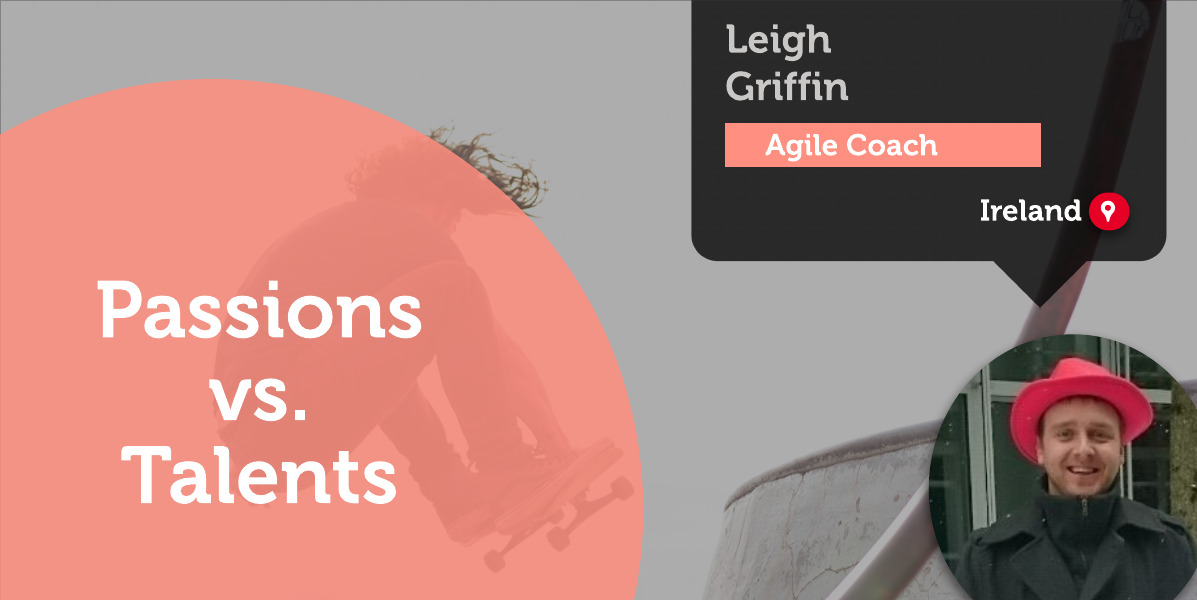A Coaching Power Tool By Leigh Griffin, Management and Agile Coach, IRELAND

Passions vs. Talents Continuous Improvement
The philosophy of Continuous Improvement (CI) is to foster an ongoing commitment to improving any aspect of a person, a process, a product, or a service. The goal in many respects is to undertake a journey towards a horizon goal, with bigger goals and milestones encountered on the path as incremental progress is achieved. That horizon constantly shifts, meaning the pursuit of perfection is rarely if ever attained. Provoking a CI mindset in individuals is a key goal of companies, as individuals help to drive a wider initiative towards a destination, bettering not just the company or team, but also the individual. The CI mindset becomes a challenge to instill, nurture, maintain and sustain. Coaching plays a key role in unlocking a CI mindset and is a power tool in and of itself to achieve the overall goals of the philosophy. Therefore a particular CI goal is analogous to a Coaching conversation, wherein a deep exploration of the desired future state results in a conversation around progressing a path forward, with commitment and accountability key conversation points as a journey of understanding takes place.
Passions vs. Talents: Passions Are a Key Bridge Towards Talent Gaps
Achieving any goal innately taps into either a person’s Talents or their Passions. Talents, or skills, are metrizable and testable. They are something that can be nurtured and invested in with time and patience. Passions are less malleable than Talents and while Passions change over time, it requires environmental support as well as time to allow Passions to form and grow. Passions are a key bridge towards Talent gaps. If someone has the Passion for an area but lacks the key Talents, it can become a motivator and a focal point to help grow and embed the Talents. Talents without Passions can hurt the mental health, motivation, and engagement of a person. Talents and Passions in unison help to create a very motivated and empowered individual. They have the drive and capability to achieve a goal and the challenge becomes trying to direct that towards an organizational goal. The OPT model [1] within Red Hat examines that intersection point.
The goal is often to define a path forward where an individual can progress their mindset, their skills, their abilities, and arrive at a destination. Coaching is a wonderful complement in such a away.
Passion vs. Talent: An Exploration
With this knowledge, Passions or Talents often become something that a client gets stuck on while exploring a path forward towards a coaching goal. Several key powerful questions are recommended to allow the client to explore what Talents or Passions might play into progressing their current goal and may shine a light on whether there is an underlying Passion mismatch, which can then be used for further exploration on feelings. This is a very powerful tool to progress a client and some sample questions are provided.
- What talents are needed to help you achieve your goal?
- What passions can you tap into to achieve your goal?
- What are you passionate about?
- How can you channel your passions into your plan?
How to Find Your Passion and Talent
Helping a client to understand the innate passions they have for a subject in conjunction with exploring the talents that they have at their disposal can help open up a different perspective within a coaching session. Having the client identify gaps, mismatches, or complementary overlaps can help to progress a session that is getting stuck. It can leave the client feeling like a path forward exists, even beyond the goals of that particular session, as it raises awareness of some potential driving force that they can tap into, be that a Talent or a Passion.
References
Red Hat’s Organisation, Passion, and Talent Model